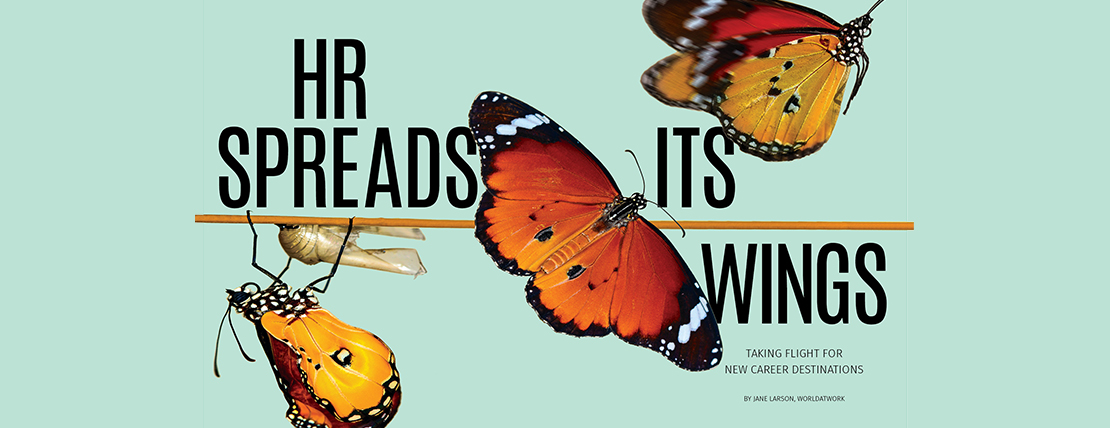If you’re an HR professional, it’s time to start looking for broader experiences, thinking strategically more than administratively and developing your business sense to become more of a partner to business leaders.
“You want to be where the action is,” said Kate Jackson, an HR executive recruiter with 20 years’ experience at corporate and retained search companies. “You want to be the person (about whom leadership says), ‘Who can we ask to solve this problem?’ They’re going to move problem solvers from one problem or opportunity to the next.”
“Maybe the burning question is, ‘there are so many people who have left the workforce, is this the new gig economy, can I make a living doing contract work in multiple places, can I start a business?’ there’s just a million ways to rethink what we’ve always done and to repackage it.”
“In the HR space there are so many new paths, so many new questions, that there’s an opportunity to really sit back and reflect and say, ‘What’s the burning question today?’” added Jennifer Deutsch, chief talent officer and vice president of executive search at the Institute for Corporate Productivity. “Maybe the burning question is, ‘There are so many people who have left the workforce, is this the new gig economy, can I make a living doing contract work in multiple places, can I start a business?’ There’s just a million ways to rethink what we’ve always done and to repackage it.”
The U.S. Bureau of Labor Statistics’ (BLS) Occupational Outlook Handbook predicts jobs in human resources are expected to grow faster, and in some cases much faster, than the average for all occupations. For example:
- The number of jobs for HR specialists is forecast to rise 7% from 2019 to 2029, a faster-than-average jump of more than 46,900 jobs from the 666,500 specialists employed in 2019. Their median pay in 2019 was $61,920 a year.
- The number of jobs for training and development specialists is forecast to rise 9%, much faster than average, during that period, up 28,200 from 327,900 such specialists in 2019. Their median pay in 2019 was $61,210 a year.
- The number of jobs for compensation, benefits and job analysis specialists is forecast to grow 8%, also much faster than average, up 7,500 from the 94,900 such specialists in 2019. Their median pay in 2019 was $64,560 a year.
- The number of jobs for HR managers is forecast to rise a faster-than-average 6% between 2019 and 2029, up 10,400 from the 165,200 managers employed in 2019. Their median pay in 2019 was $116,720 a year.
Hot-button issues drive demand
The BLS says increasingly complex employment laws and expanding options for health care coverage are helping drive demand for HR specialists, and notes that the creation of new companies and the expansion of existing ones mean more HR managers will be needed to administer programs.
Russ Wakelin, chief experience officer at PayFactors, says the cloud-based compensation management software company is seeing growth in almost all HR specialties. Issues of pay equity are driving demand for compensation analysts; interest in alternative forms of compensation is driving demand for benefits analysts; and the national reckoning with racial issues has increased organiza- tions’ focus on diversity and inclusion, he said.
The COVID-19 pandemic is another factor driving demand for solutions from HR professionals, Deutsch said. CHROs have had to create or implement plans for a pandemic, including work-from-home policies, responses to drastic business slowdowns and the prospects of women or recipients of unemployment benefits not returning to the workforce.
Jackson and Deutsch both see HR specialties as early steps on an HR career path.
For example, while specialties such as compensation or recruiting, or expertise in the Family Medical Leave Act of 1993 (FMLA) or OSHA rules, tend to be more junior positions, those who stay in a specialty probably do so and move up on that path because they are very good at their specialty, Deutsch said. Generalists have duties in all areas of human resources, according to the BLS, ranging from recruitment and employee relations to compensation, training and administering policies and programs.
More than being experts at medical-leave policies or health and safety requirements, generalists must think more strategically, Jackson said.
“You want the strategic work. You want the work that’s tying you close to the business, where you’re feeling the stresses on the business, so you can advise the business leaders from a human capital perspective [on] how to best approach the business in the human capital angle.”
“More than being experts at medical leave policies or health and safety requirements, generalists must think more strategically.”
Generalists also tend to have more of a marketing and sales personality, she said, because people entering these more senior positions need to sell their vision and fight for resources and business leaders’ attention.
Deutsch sees the generalist’s career path evolving. “The old model was that you did a rotation through all of these to get an understanding of all the components of HR in the hopes of becoming a CHRO,” she said.
“That’s probably still the case, although I’m seeing less and less of that. It’s more of an understanding of how it works than actually having to do it. As you become a senior generalist, you have to partner with compensation, and you partner with benefits, and as you’re doing your job … it’s more of a three- pronged person that helps the business.”
New paths emerge
HR business partner is one emerging option for generalists seeking to advance. In these positions, an HR professional is paired with a C-level executive such as the chief information officer or with an aspect of the business such as marketing or finance. HR business partners help executives think through organizational design, weigh in-house versus outsourcing strategies and provide them with research on workforce pay scales in various markets, Jackson said, adding that familiarity with data helps those in these roles build credibility with executives.
Another possible path leads to becoming chief experience officer, a role that emerged about 10 years ago and has been refined in the past five years, Wakelin said.
At PayFactors, Wakelin’s primary job is getting the company closer to its clients and its clients closer to the company. He talks to clients as well as PayFactors’ product development, sales and service staffs to help the business find ways to ensure everyone’s road maps align.
“If you’re interested in client experience or your organization is considering client experience, I think it’s a really important role,” he said. Employees in product management, sales and service may look at the client experience from their own perspectives, which he said can hinder them from focusing on clients as much as they should, while a chief experience officer can look at things more holistically.
Wakelin’s background is in software development and engineering, not HR. But the skills he’s acquired along the way are similar to those that HR professionals possess — problem solving, data analysis and an ability to communicate between business and technical employees at all levels, for example. Of all the skills and attributes Wakelin has picked up and nurtured, however, empathy is likely the most important of all.
“It’s really critical that you feel the challenge a client is facing, the worry and the concern they have for whatever the challenges in their job are, what- ever challenge their company is facing,” he said. “And I think a lot of HR folks have empathy, sort of like a core part of their job description.”
Deutsch sees the CHRO position turning into something similar to the chief experience officer role. These new executives may pull from marketing, operations and human resources to design an organization’s culture, build teams and integrate the business and employee experience.
“It’s interesting, it’s exciting because the Chief Experience Officer is basically aligning the customer experience and the employee experience.”
“It’s interesting, it’s exciting because the chief experience officer is basically aligning the customer experience and the employee experience,” she said, noting that the strategic decision making process used to design experiences for customers can be applied to attracting, engaging and retaining employees.
Positions such as Wakelin’s also can be for leaders who have a good feel for an organization’s culture. “The chief experience officer is really thinking about … the things that matter to the employees we most want,” such as 401(k)s for 55-year-olds versus help with college loans for twentysomethings, Jackson said. These leaders also focus on optimizing the money an organization spends to keep its employees happy enough to stay.
Advice on moving up
As career paths for those in human resources continue to evolve, Jackson, Deutsch and Wakelin offer these suggestions for HR professionals looking to move up:
Broaden your experience beyond your current organization.
HR professionals have an advantage in that they can jump industries to ones with a better future, Jackson said. The logistics and supply chain sector, for example, has become more prominent due to the pandemic, Deutsch said. As health concerns subside, small and medium-size businesses will come back, aided by consumers who want to “buy local” and support their neighbors. “Any business can benefit from diversification of knowledge and point of view,” she said.
Keep learning.
Learning is a hot area now for specialists, Jackson said, as employers recognize the cost-effectiveness of training current employees to meet future needs, the value of their institutional knowledge, and the high cost of hiring and relocating new talent.
Develop a business sense and get comfortable with data.
Be curious about how the business makes money and where it is going, Jackson said. Learning your business’s domain and talking with its clients will help you understand clients’ challenges and those of your front-line workers who deal with clients, Wakelin said.
Broaden your experience beyond your specialty.
Adding a rotation in talent management or succession planning broadens your horizons and makes you more marketable, Jackson said. Consider lateral moves, too, especially in this economy. “Maybe the job you’ve taken two steps back is giving you a skill you wouldn’t ordinarily have,” Deutsch said. “Do something different. That’s the skill that’s going to make you a more valuable employee.”







